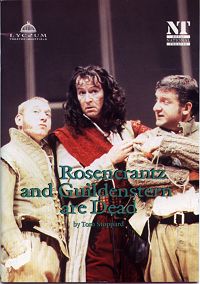
 |
Tom Stoppard's Rosencrantz and Guildenstern Are Dead, which the Royal National Theatre showed in the National Theatre in Sofia, opens with the following stage remark, "Two Elizabethans passing the time in a place without any visible character .....," Ros and Guil are betting on the toss of a coin and Ros always wins....
This impressive play has obviously been put on stage by Matthew Francis on precisely the same principle, of the director winning whatever coin he tossed. This principle embodies Mr. Francis' understanding of the theatre, as well as his concepts about what is needed to constantly reproduce a very strong tradition of national theatre. His staging of the play commands our deepest attention through his very clear vision of how precise its rhythm should be, how beautifully the stage space should be handled, and how professionally should the actors act, respectfully articulating every single word in the text.
The game has no end, it always starts from the beginning. There are those words, uttered by Guildenstern toward the end of the play, that "there must have been a moment at the beginning, where we could have said 'no'. But somehow we missed it." The participants in the game swap places constantly: leaders and those they are leading, manipulators and those they manipulate, actors, directors, everyone big and small......Everything can be rephrased, or paraphrased, each sentence reinterpreted or replaced, truth can be acted, voiced and demonstrated, as in 'The Murdet of Gonzago', and later replaced by another truth just as convincing. Hamlet could be murdered by Rosencrantz and Guildenstern because such are their orders in the letter, yet the letter is replaced and, lo and behold, murdered are Rosencrantz and Guildenstern because the game has changed. Irrespective of who is playing with whom, questions could be asked and answers acted out because "There were always questions" but the game's major question is Death. Not so much the issue of "the weary life/But that the dread of something after death/The undiscover'd country from whose bourn/No traveller returns" (in Shakespeare's Hamlet), But the issue of the absurdity of life's game which is actually a game of Death. "We might as well be dead. Do you think death could possibly be a boat?" Rosencrantz asks.
Showing us this play by Tom Stoppard, The Royal National Theatre actually showed the vitality of Shakespeare's eternal idea of the world as a stage, of theatre still being the venue of brilliant professional acting through which we could discuss human place in the world and in 'the game'. Just like the Tragedians headed by the magnificent Player King, Alan Howard, the theatre can present everything professionally, clearly, beautifully and orderly, and this is precisely what the Author aims at, for he has obviously wanted to "do blood and love without the rhetoric" and "blood and rhetoric without the love", or "all three concurrent or consecutive".
He did do it, and in a classically brilliant manner.
Violetta Decheva
Kultura Weekly, 7.6.96. (Translation from the Bulgarian review).
(M.H.)